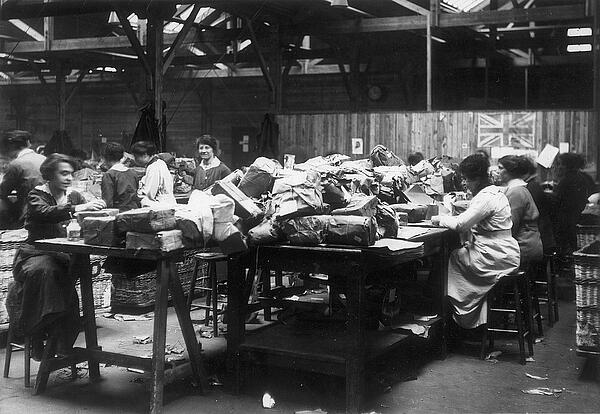The Role of the Post Office in World War One
The Post Office had an important role in World War One, on both the home front and the frontline. Many Post Office workers fought on the frontline, with employers like the General Post Office encouraging their employees to sign up. They had their own regiment called the ‘The Post Office Rifles’ and 8,500 Post Office workers were amongst those killed in the war.
The Post Office helped the war effort in other way too. Its employees kept the Postal Service up and running on the home front whilst also delivering letters and packages to the troops on the frontline.
More than 75,000 Post Office workers left home to fight. As many as 12,000 of them joined the the ‘Post Office Rifles’. The Rifles were founded in 1868 and were almost solely made up of Post Office workers. So many men wanted to sign up that a second battalion of the Post Office Rifles had to be created. They fought in many of the major battles in Europe.

The delivery of letters was vital to the war effort. Letters were not just treasured possessions, they boosted morale both in the trenches and at home. Letters served as propaganda as they were censored before reaching Britain, ensuring that no demoralising messages reached the home front.
Thanks to the Post Office, the delivery of these letters was remarkably efficient. In December 1914, a special sorting office - the Home Depot - was built to deal with mail sent from home. It took only two days for the mail to reach the front and more than 19,000 mailbags crossed the channel each day. In December 1914 an internal military Post Office system was also established so that soldiers could keep in touch with families and friends fighting across the frontline.
Carrier pigeons were also used to deliver mail, but their job was dangerous. Men on both sides tried to shoot down the birds as they flew across the Western Front. By 1918 the British Army was using 22,000 pigeons to carry post to the trenches.
All of the countries involved in the war made agreements to ensure that post could be delivered to and from prisoners of war. The Post Office played a vital role in delivering the post to the POW camps. The case of Rifleman Harry Brown shows the importance of letters for prisoners. Harry Brown’s mother believed that her son was missing in action until she received a letter from him, informing her that he was in a German camp. Sadly, Harry died on the 27 November 1918, 16 days after the war ended.
The Post Office also saw a huge change in the role women. Many more employment opportunities opened up to women. During the war, some 35,000 women were working in temporary positions in the Post Office.. The demand for staff increased dramatically to fill in for those men who had been sent to war.
See also: World War One Poets
MLA Citation/Reference
"The Role of the Post Office in World War One". HistoryLearning.com. 2024. Web.
